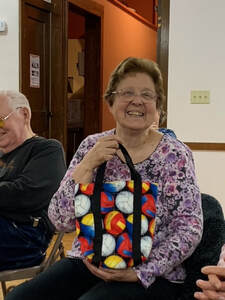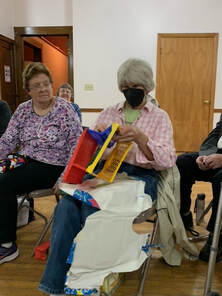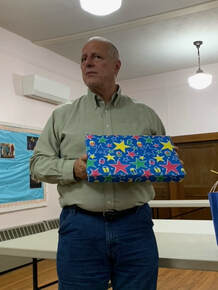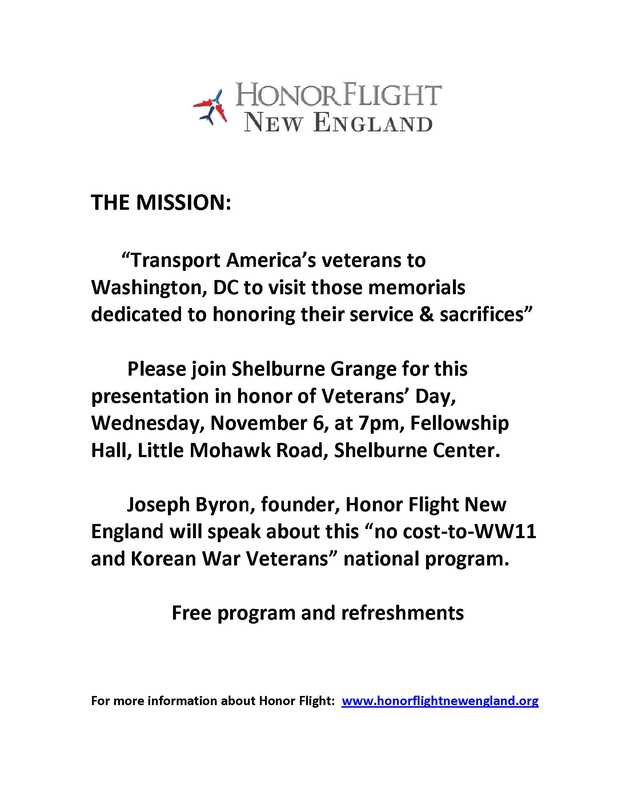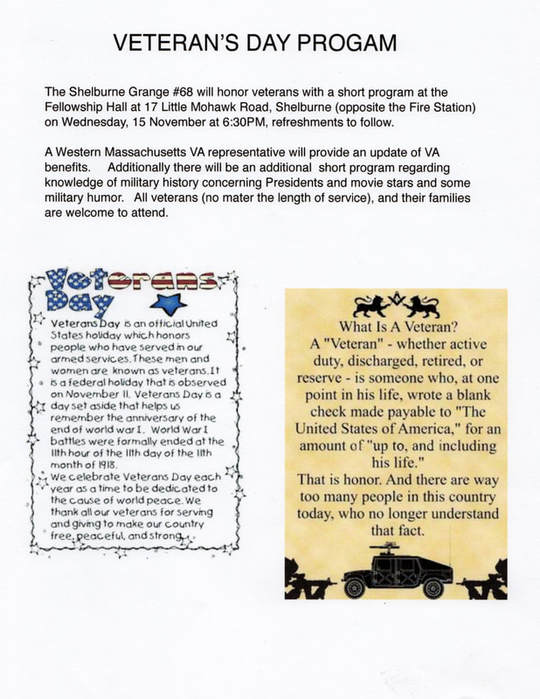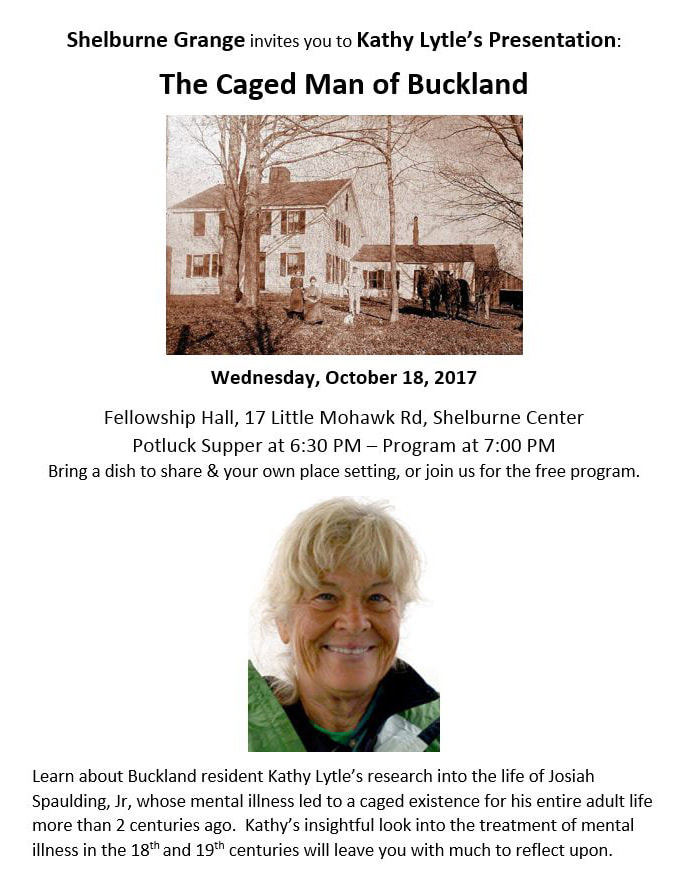Grange meetings are held the 1st and 3rd Wednesdays at 7 pm or as noted.
Fellowship Hall, 17 Little Mohawk Road, Shelburne Center
All programs are open to the public...come and join us!
Fellowship Hall, 17 Little Mohawk Road, Shelburne Center
All programs are open to the public...come and join us!
Tuesday, June 18: Agricultural mystery ride followed by ice cream!
Thursday, July 4: Join us at the July 4th parade followed by a chicken barbeque at Buckland Shelburne Elementary School
Tuesday, July 16: Business Meeting and short program
Wednesday, August 7: Shelburne Falls Military Band Concert and Pie Sale
Tuesday, August 16: Business Meeting and short program
Saturday, August 24: It's the SHELBURNE GRANGE FAIR!
Tuesday, June 18: Agricultural mystery ride followed by ice cream!
Thursday, July 4: Join us at the July 4th parade followed by a chicken barbeque at Buckland Shelburne Elementary School
Tuesday, July 16: Business Meeting and short program
Wednesday, August 7: Shelburne Falls Military Band Concert and Pie Sale
Tuesday, August 16: Business Meeting and short program
Saturday, August 24: It's the SHELBURNE GRANGE FAIR!
PAST PROGRAMS
Words for Thirds Auction 2023 - a lot of fun!!
Theme: Primary Colors
Theme: Primary Colors
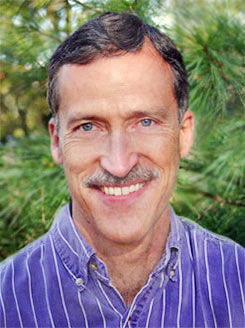
July 12, 2021, 7 pm
A Zoom presentation by John Root, Naturalist/Landscaper
Attracting Birds, Butterflies, and Other Beneficials
A recording of this event will be broadcast by Falls Cable.
In-person meetings will resume the first Wednesday of August!
Wednesday, January 8, 2020: Dues Paying pot luck supper at 6:30 pm with travel program by Caitlin Burnett
Caitlin is pursuing degrees in Cultural Anthropology and Sustainability at the University of New Hampshire. She has devoted her college career to giving back: as research assistant in the Department of Anthropology at UNH, member of the Indigenous New Hampshire Collaborative Collective, researcher with Weaving Strands of Knowledge-- working with communities in Bhutan, India, and the United States; and an activist with the Student Environmental Action Coalition. She studied abroad for her fall semester at the University Andres Bello in Santiago Chile, focusing in Latin American Anthropology and Spanish language. As part of the homestay program, she was exposed to more personal interaction and immersion into the host culture. Additionally, there were many opportunities for hiking, camping, horseback riding and water rafting.
Program highlights featured study and exploration of the language, culture, literature, arts, history, anthropology, native cultures, politics, economy, and technology through courses, excursions and field trips. In addition to coursework, the program sponsored an in-depth week-long field study to Northern Chile which included visiting sites of native culture, guided excursions to national parks and explorations of protected ecological areas.
Caitlin’s plans for post-graduation are to serve with City Year New Hampshire starting in the fall, and attending graduate school.
Caitlin is pursuing degrees in Cultural Anthropology and Sustainability at the University of New Hampshire. She has devoted her college career to giving back: as research assistant in the Department of Anthropology at UNH, member of the Indigenous New Hampshire Collaborative Collective, researcher with Weaving Strands of Knowledge-- working with communities in Bhutan, India, and the United States; and an activist with the Student Environmental Action Coalition. She studied abroad for her fall semester at the University Andres Bello in Santiago Chile, focusing in Latin American Anthropology and Spanish language. As part of the homestay program, she was exposed to more personal interaction and immersion into the host culture. Additionally, there were many opportunities for hiking, camping, horseback riding and water rafting.
Program highlights featured study and exploration of the language, culture, literature, arts, history, anthropology, native cultures, politics, economy, and technology through courses, excursions and field trips. In addition to coursework, the program sponsored an in-depth week-long field study to Northern Chile which included visiting sites of native culture, guided excursions to national parks and explorations of protected ecological areas.
Caitlin’s plans for post-graduation are to serve with City Year New Hampshire starting in the fall, and attending graduate school.

SPECIAL PROGRAM - COME AND JOIN US!
Fellowship Hall, 17 Little Mohawk Road, Shelburne, MA
Friday, March 18, 2016
6:30 pm Pot Luck Supper
7 pm Barry Deitz's presentation: "When the Road Came Through--How Construction of I-91 Changed Western Massachusetts"
Fellowship Hall, 17 Little Mohawk Road, Shelburne, MA
Friday, March 18, 2016
6:30 pm Pot Luck Supper
7 pm Barry Deitz's presentation: "When the Road Came Through--How Construction of I-91 Changed Western Massachusetts"
When the Road Came Through
Excerpts from Barry Deitz’s Presentation
We are a restless people. We have been called the most mobile nation in the world. Whether it’s vacationing in a remote National Park or moving the whole family across the country for the possibility of a better life, the story of America is in many ways a story about hitting the road and heading toward the horizon, the dream of something better over the next hill.
About 40,000 miles of roads were built between 1956 and 1978 as a result of the Interstate Highway plan and those freeways changed the face of America. In good ways, and bad. Part of that 40,000 miles of new road included the 291 miles of Interstate 91 which ran from New Haven, Connecticut up to the Canadian border.
The commercial opportunities were obvious. Easier access to distant markets for produce, timber and small manufactures, specifically in providing a faster way down to Springfield and up to Brattleboro. But what many of the residents of the Pioneer Valley recall of those days when the road came through was how devastating it was for many local businesses. For generations the regular traffic along Route 5 had supported gas stations, restaurants, garages, fruit stands, small manufacturing concerns and many home businesses. The new Interstate made it possible without a second look to bypass all these places dependent on drive-by commerce.
A new highway cutting its way across a county’s farms and towns can leave a wide range of often contradictory emotions in the people affected by those changes. The very landscape itself is altered. Town residents find the geography of their home has been remade. Landmarks disappear. Fields are erased. Woodlands cut down and leveled.
Big changes are easy to spot. But in some respects it’s the small things that stay with us. Remembering a mill pond that was once in the center of town, a copse of trees or a sugar house swept away by tractors and trucks, a favorite fishing hole gone forever.
Progress inevitably has its victors and victims, its winners and losers, but it changes everyone in some way, even if it is just to make possible a quicker route to work. For those in the Pioneer Valley who remember, their history can be traced in the stories of life before and after the road came through.
Excerpts from Barry Deitz’s Presentation
We are a restless people. We have been called the most mobile nation in the world. Whether it’s vacationing in a remote National Park or moving the whole family across the country for the possibility of a better life, the story of America is in many ways a story about hitting the road and heading toward the horizon, the dream of something better over the next hill.
About 40,000 miles of roads were built between 1956 and 1978 as a result of the Interstate Highway plan and those freeways changed the face of America. In good ways, and bad. Part of that 40,000 miles of new road included the 291 miles of Interstate 91 which ran from New Haven, Connecticut up to the Canadian border.
The commercial opportunities were obvious. Easier access to distant markets for produce, timber and small manufactures, specifically in providing a faster way down to Springfield and up to Brattleboro. But what many of the residents of the Pioneer Valley recall of those days when the road came through was how devastating it was for many local businesses. For generations the regular traffic along Route 5 had supported gas stations, restaurants, garages, fruit stands, small manufacturing concerns and many home businesses. The new Interstate made it possible without a second look to bypass all these places dependent on drive-by commerce.
A new highway cutting its way across a county’s farms and towns can leave a wide range of often contradictory emotions in the people affected by those changes. The very landscape itself is altered. Town residents find the geography of their home has been remade. Landmarks disappear. Fields are erased. Woodlands cut down and leveled.
Big changes are easy to spot. But in some respects it’s the small things that stay with us. Remembering a mill pond that was once in the center of town, a copse of trees or a sugar house swept away by tractors and trucks, a favorite fishing hole gone forever.
Progress inevitably has its victors and victims, its winners and losers, but it changes everyone in some way, even if it is just to make possible a quicker route to work. For those in the Pioneer Valley who remember, their history can be traced in the stories of life before and after the road came through.


